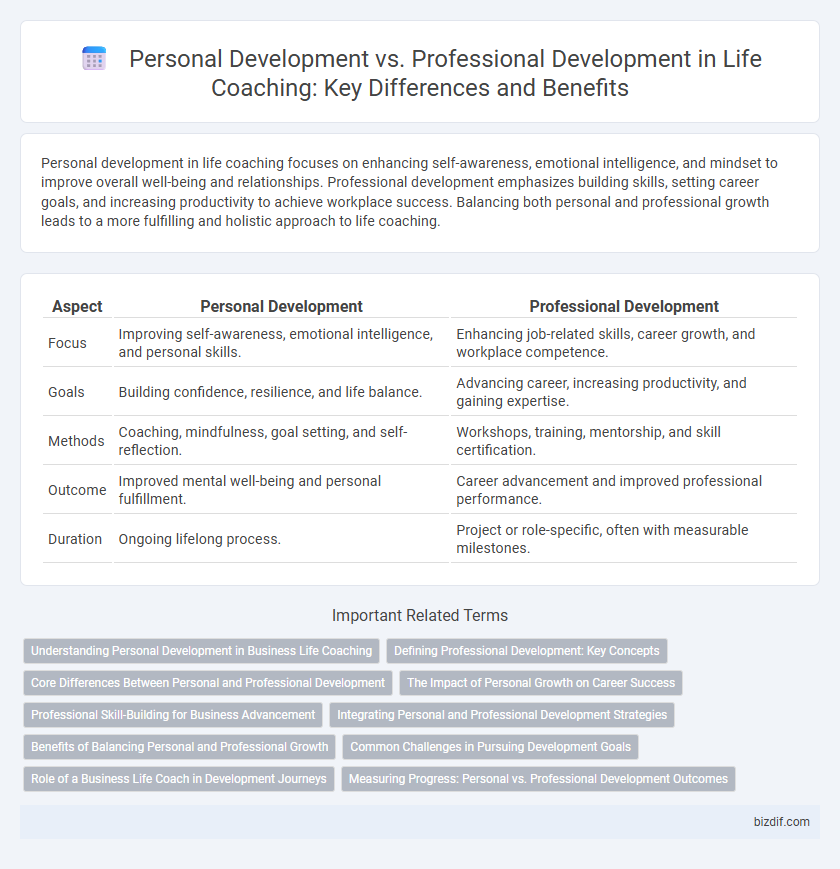Personal development in life coaching focuses on enhancing self-awareness, emotional intelligence, and mindset to improve overall well-being and relationships. Professional development emphasizes building skills, setting career goals, and increasing productivity to achieve workplace success. Balancing both personal and professional growth leads to a more fulfilling and holistic approach to life coaching.
Table of Comparison
| Aspect | Personal Development | Professional Development |
|---|---|---|
| Focus | Improving self-awareness, emotional intelligence, and personal skills. | Enhancing job-related skills, career growth, and workplace competence. |
| Goals | Building confidence, resilience, and life balance. | Advancing career, increasing productivity, and gaining expertise. |
| Methods | Coaching, mindfulness, goal setting, and self-reflection. | Workshops, training, mentorship, and skill certification. |
| Outcome | Improved mental well-being and personal fulfillment. | Career advancement and improved professional performance. |
| Duration | Ongoing lifelong process. | Project or role-specific, often with measurable milestones. |
Understanding Personal Development in Business Life Coaching
Understanding personal development in business life coaching involves enhancing self-awareness, emotional intelligence, and mindset to improve professional performance and workplace relationships. This form of coaching prioritizes individual growth that aligns personal values with career goals, fostering resilience and adaptability in dynamic business environments. Emphasizing personal development leads to improved leadership skills, increased motivation, and greater overall job satisfaction.
Defining Professional Development: Key Concepts
Professional development encompasses targeted learning activities and training aimed at enhancing job-related skills, expertise, and career growth. It includes workshops, certifications, mentoring, and continuous education designed to improve performance and adapt to industry changes. This process is essential for maintaining competitiveness and achieving long-term career objectives within a specific professional field.
Core Differences Between Personal and Professional Development
Personal development centers on enhancing individual skills, emotional intelligence, and self-awareness to improve overall life satisfaction and well-being. Professional development targets acquiring job-related skills, industry knowledge, and career advancement strategies to boost workplace performance and opportunities. Core differences lie in their objectives: personal growth aims for holistic self-improvement, while professional growth focuses on career-specific competencies and success.
The Impact of Personal Growth on Career Success
Personal development significantly enhances career success by improving emotional intelligence, communication skills, and self-discipline, which are critical for workplace effectiveness. Growth in self-awareness and resilience fosters better decision-making and leadership abilities, directly influencing professional achievements. Integrating personal growth strategies into career planning accelerates skill acquisition and adaptability, leading to sustainable career advancement.
Professional Skill-Building for Business Advancement
Professional skill-building for business advancement sharpens expertise in areas like leadership, communication, and project management, directly impacting career growth and organizational success. Unlike personal development, which enhances overall well-being and emotional intelligence, professional development targets specific competencies to increase productivity and marketability. Focusing on continuous professional learning ensures adaptability in evolving industries and fosters strategic advancement within competitive business environments.
Integrating Personal and Professional Development Strategies
Integrating personal and professional development strategies enhances overall growth by aligning individual values with career goals, fostering resilience, and improving emotional intelligence. Life coaching emphasizes tailored approaches that bridge self-awareness and skill-building, enabling clients to thrive both personally and professionally. This holistic integration cultivates balanced success, increased productivity, and sustained motivation.
Benefits of Balancing Personal and Professional Growth
Balancing personal development and professional development maximizes overall life satisfaction by fostering emotional intelligence and career advancement simultaneously. Integrating self-awareness, resilience, and communication skills enhances workplace performance and interpersonal relationships. This holistic growth approach promotes sustained motivation, reduces burnout, and builds a well-rounded skill set essential for long-term success.
Common Challenges in Pursuing Development Goals
Balancing personal development and professional development often involves overcoming challenges such as time management, prioritization, and maintaining motivation. Clients frequently struggle with setting realistic goals that align with both their personal values and career ambitions. Effective life coaching addresses these obstacles by creating tailored strategies that integrate holistic growth, fostering sustained progress in both areas.
Role of a Business Life Coach in Development Journeys
Business life coaches bridge personal development and professional development by aligning individual values with career goals to enhance overall growth. They help clients identify strengths, overcome limiting beliefs, and build strategic plans that foster both personal fulfillment and business success. This integrative approach accelerates skill acquisition and emotional intelligence, crucial for sustained leadership and productivity.
Measuring Progress: Personal vs. Professional Development Outcomes
Measuring progress in personal development often involves tracking changes in self-awareness, emotional intelligence, and overall life satisfaction through reflective journaling and feedback from close relationships. Professional development progress is typically quantified by achieving specific career milestones, skill certifications, performance reviews, and increased productivity metrics. Combining qualitative insights from personal growth with quantitative data from professional achievements provides a comprehensive view of overall development success.
Personal development vs Professional development Infographic

 bizdif.com
bizdif.com